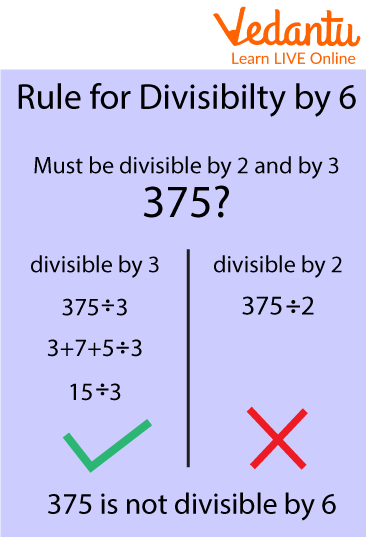




Step-by-Step Guide: Testing Divisibility by 6 with Examples
Mathematicians use divisibility tests or division rules to determine if a number is divisible by another integer without using the actual division mechanism. If one integer is totally divisible by another, the quotient is a whole number and the remainder is zero. But some numbers cannot be totally divided by any other integer, such numbers have a remainder other than zero.
These guidelines assist us in determining the actual divisor of a number just by studying the digits of the number. Similarly to check the divisibility by 6 there are specific rules which will further be discussed.
What is Meant by Divisibility?
Divisibility is the ability of numbers that can be divided without leaving any remainder behind. There are various divisibility tests of numbers between 1 to 9. Through this divisibility, we can determine whether a large complex number will be divisible or not. Let us now learn about the divisibility rule of 6 which includes the divisibility rule of 2 and 3.
How to Check Divisibility by 6?
If a whole integer meets the two requirements listed below, it is said to be divisible by 6.
The provided entire number must be divisible by two. A number is divisible by two if the digit in the unit's position is even, i.e., 0, 2, 4, 6, and 8.
The specified whole number has to be divisible by three. A number is divisible by three if the sum of its digits is exactly divisible by three.
When performing the divisibility test of 6, both requirements should apply to the number. If a number does not satisfy both of these requirements, it is not divisible by 6.

Example of Divisibility By 6
Numbers Divisible by 6
The numbers which are divisible by 6 are the ones having even numbers at the unit places and all the digits, if added, would be perfectly divisible by 3. Let us take an example of the number 12. In units place of 12, 2 is there, which is an even number and is divisible by 2, whereas, if we add both the digits 1 and 2 we get a result as 3 which is also divisible by 3. As the number is divisible by both 2 and 3 so, it will also be divisible by 6.
Test of Divisibility by 6
To understand and test the divisibility of 6 of the large numbers we can take the example of number 136582. In this number at the unit place, there is 2 which is, even so, making it divisible by 2. To check the divisibility by 3 we add all the digits 1, 3, 6, 5, 8, and 2 which will result in 25 which is not divisible by 3. So the number 136582 is not divisible by 6. This is so because to be divisible by 6, the number should be divisible by both 2 and 3.
Conclusion
The number is divisible by 6 if it is divisible by both 2 and 3. To check the divisibility of a number by 2 the unit's place should have an even number and the sum of the digits of the number should be divisible by 3. If the number is not divisible by either 2 or 3 then it would not be divisible by 6.
Sample Questions
1. The number 256 is divisible by 6.
True
False
Ans: False
Explanation: The number is not divisible by 6 because if we add all the digits then the sum would result in 13 which is not divisible by 3 making it the number which would not be divisible by 6.
2. The number divisible by 2 would have 5 in the ten’s place and 0 in the unit’s place.
True
False
Ans: True
Explanation: The number would be divisible by 2 as the number in the unit’s place should be 0, 2, 4, 6, and 8. The number in the ten’s place does not have any role in determining the divisibility by 2.
3. Which of the following numbers is divisible by 6?
966
964
935
961
Ans: 966
Explanation: The number 966 is divisible by 6 as the unit place of the number is even making it divisible by 2 and the sum of the digits is 21, which is divisible by 3. As the number is divisible by both 2 and 3 it is divisible by 6. The number 964 is not divisible by 6 because the sum of the digits is 19 which is not divisible by 3. And the numbers 935 and 961 have odd numbers in their unit place making them not divisible by 2.
FAQs on How to Quickly Identify Numbers Divisible by 6
1. What is the divisibility rule for the number 5?
Ans: According to the divisibility rule of 5, the last digit of the number should be either 5 or 0. This would lead to the number being divisible by 5. For example, 534690 would be divisible by 5 as the last digit is 0.
2. What exactly are divisibility rules?
Ans: A divisibility test is a simple method for determining if a given number can be divided by a set divisor without actually conducting the division procedure. If a number is divided entirely by another number, the quotient must be a whole number, and the remainder must be zero.
3. What is the divisibility rule of 9?
Ans: The divisibility rule of 9 states that you need to check the sum of the digits of the given number. If the sum is divisible by 9 then the number will also be divisible by 9.
4. List the numbers which are divisible by 6.
Ans: Some of the numbers which are divisible by 6 are: 72, 84, 90, 96, and many more.
5. Write the divisibility rule of 10?
Ans: The divisibility rule of 10 states that the number should have 0 in the unit place to be divisible by 10.























